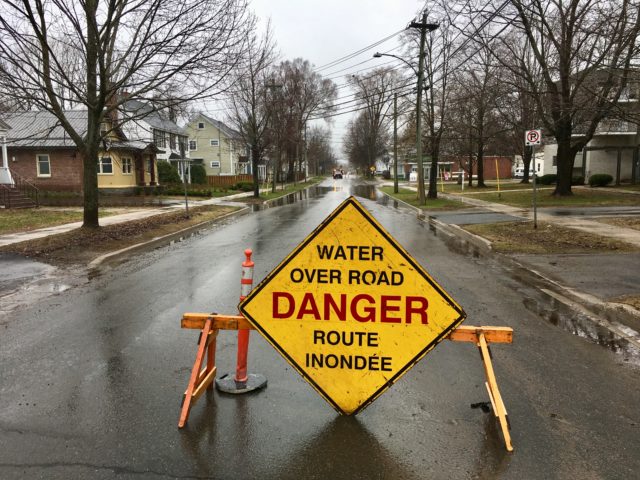[vc_row][vc_column][vc_single_image image=”138217″ img_size=”700 x 400″ alignment=”center”][vc_column_text] Our Executive Director, Lois Corbett, appeared on CBC New Brunswick’s evening news broadcast, Shift NB, and CBC’s The National on May 7 to comment on contaminants in the floodwaters wreaking havoc across the province.
As floodwaters continued to rise in some parts of the province, officials with New Brunswick’s Emergency Measures Organization warned it could be contaminated with everything from farming pesticides and fuel spills to untreated sewage and other hazardous chemicals.
“We also need to be vigilant of oil spills and diesel tank spills,” Corbett told CBC. “All of that comes with increased risks.”
In a longer conversation with CBC Shift NB, Corbett urged residents affected by flooding to contact local authorities if they see or smell any suspected spills or questionable chemicals in the water. She also cautioned parents to keep children away from floodwaters as much as possible.
“It’s one thing to play in a rain puddle out on the farm after a rain, but floodwater has poop in it, and it’s quite a bit more dangerous,” she said.
“We don’t know all the root causes yet, whether it’s upstream larger-scale clearcuts [in our Crown forest], more intense snow later in the winter, we don’t know all the causes. To date, it seems that municipal officials are keeping a 24/7 watch on our sewage systems, that public health is out there giving us exactly the right warnings, and that our mayors and councillors all along the banks of the St. John River are doing everything they can to help evacuate homeowners and keep others homeowners safe.
[/vc_column_text][/vc_column][/vc_row][vc_row][vc_column][vc_separator color=”turquoise”][vc_custom_heading text=”Click here to tell us how the 2018 Flood affected you!” font_container=”tag:h4|text_align:center” google_fonts=”font_family:Alegreya%20Sans%3A100%2C100italic%2C300%2C300italic%2Cregular%2Citalic%2C500%2C500italic%2C700%2C700italic%2C800%2C800italic%2C900%2C900italic|font_style:400%20regular%3A400%3Anormal” link=”url:http%3A%2F%2Fwww.conservationcouncil.ca%2Fen%2Ftell-us-your-flood-story%2F|||” css=”.vc_custom_1525792527904{margin-top: -20px !important;}”][/vc_column][/vc_row][vc_row][vc_column][vc_separator color=”turquoise”][vc_column_text]
When we get past this emergency stage, then comes the time for reflection — what could we have done better, and what will we need to do in these times of changing climate to become more ready for extreme weather events, floods, ice storms and hurricanes.”
As floodwaters began to recede and cleanups began, Corbett told CBC on May 11 that residents should follow the advice of EMO and public health when disposing of sandbags and other items damaged by floodwaters.
“That bacteria, which really can have an impact on human health, are in the bag and in the sand,” she said. “So the last thing you want to do is to put that pollution back into the system.”
Louise Comeau, former director of the Conservation Council’s Climate and Energy Solutions program, told the Canadian Press that cities across Canada will have to adapt and prepare for more frequent and more intense extreme weather events, saying “the reality is that people expect the world to be the way it was, but it’s not.”
[/vc_column_text][/vc_column][/vc_row][vc_row][vc_column][vc_custom_heading text=”For more information, please see these recommended resource:” font_container=”tag:h4|text_align:left” google_fonts=”font_family:Alegreya%20Sans%3A100%2C100italic%2C300%2C300italic%2Cregular%2Citalic%2C500%2C500italic%2C700%2C700italic%2C800%2C800italic%2C900%2C900italic|font_style:500%20bold%20regular%3A500%3Anormal”][vc_column_text css=”.vc_custom_1525792631834{margin-bottom: -5px !important;}”]
- Read our 2017 findings on New Bruswickers concerns about freshwater and preparedness for extreme weather events: Majority of New Brunswickers worried about pollution going into rivers, says Conservation Council report on water and weather preparedness
- Read our list of recommendations on how to minimize risks to citizens from climate change-induced extreme events (Feb 2016)
- Read our presentation on community capacity to adapt to climate change following post-tropical storm Arthur (Feb 2016)
[/vc_column_text][vc_custom_heading text=”Learn more about how New Brunswick is adapting to extreme weather:” font_container=”tag:h4|text_align:left” google_fonts=”font_family:Alegreya%20Sans%3A100%2C100italic%2C300%2C300italic%2Cregular%2Citalic%2C500%2C500italic%2C700%2C700italic%2C800%2C800italic%2C900%2C900italic|font_style:500%20bold%20regular%3A500%3Anormal”][/vc_column][/vc_row][vc_row][vc_column][vc_column_text]
- Read our May 2018 story: St. John River flood: what you need to know so far
- Read our May 2018 story: Flooding reaches historic 2008 level, likely to get worse…
- Read our July 2017 story: Mayors who preserve wetlands save big bucks, study finds
- Read our Louis Comeau’s Nov 2016 interview with CBC: Louise Comeau on flood preparedness in New Brunswick
[/vc_column_text][/vc_column][/vc_row][vc_row][vc_column][/vc_column][/vc_row]

